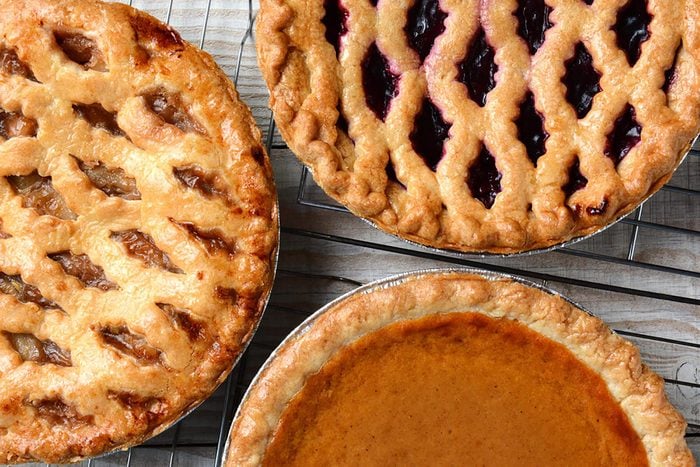
Want to avoid holiday weight gain? Save your splurges
If you’re going to indulge a few times over the season, concentrate on foods that are special or unique to this time of year—not the ones you can get year-round to avoid holiday weight gain, says Gary Foster, PhD, chief scientific officer for WW (formerly Weight Watchers; the company’s motto now is Wellness that Works to reflect a focus on overall health as well as weight). That means letting yourself enjoy a piece of pumpkin pie on Thanksgiving, but not a stack of chocolate chip cookies at the office Christmas party. The seasonal focus means when the holidays are past, the temptations will go with them and you can return to healthy eating.

Wait to imbibe
“We recommend you delay your drink until you have food in your stomach,” says Elizabeth Politti, RD, nutrition director for the Duke Diet and Fitness Center. She explains that food can help delay the absorption of alcohol. “Set some limits for yourself about alcohol such as that you won’t have more than one or two drinks.” And know yourself. If one glass of wine makes you completely lose your eating inhibitions, maybe it’s better to abstain in the face of food temptation.
Here’s why binge-drinking is on the rise in Canada—and why it’s so dangerous.

Stay active
If you’re a regular gym rat, great. But if not, you can still avoid holiday weight gain by taking every opportunity to stay physically active. That means taking the stairs instead of the elevator, parking as far as possible from the store entrance, getting off the bus a few stops early—all the little tricks for adding activity to your day you’ve read before. “Just assume the vertical and keep moving,” says Pamela M. Peeke, MD, MPH, chairperson of the Jenny Craig Science Advisory Board and professor of medicine at the University of Maryland. “And add bits of intensity, short bursts of more activity, whenever you can.” These are the best workouts for people who hate exercise.
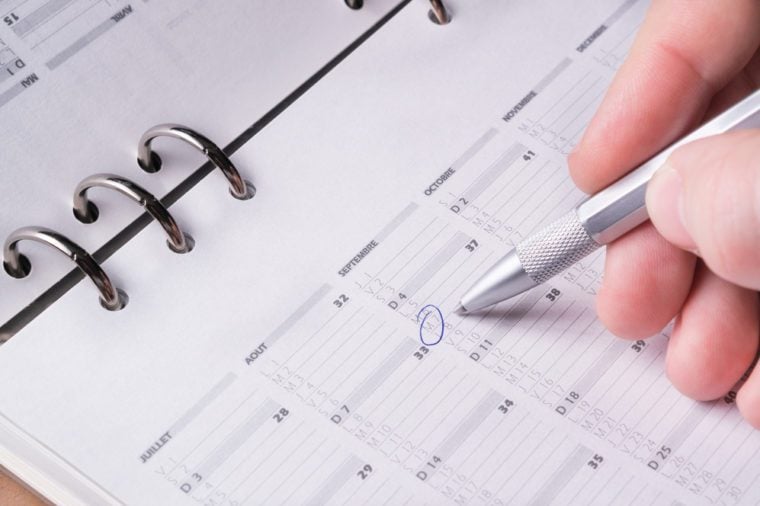
Keep a calendar
“I have my clients print out a monthly calendar and mark the actual holidays plus the parties they’ll be attending,” says Liz Josefsberg, a weight loss coach and author of Target 100. “Then they can see that’s it’s usually only about one-seventh of the days that have special events; just seeing it in that way makes people wake up.” Looking at the calendar is a stark reminder that the weeks between Thanksgiving and New Year’s aren’t really 12 weeks of nonstop eating, but rather a few extra parties or dinners out with friends or family. The challenges are more manageable when you look at it that way.

Chit chat instead of chewing
Don’t forget the purpose of parties—an opportunity to get together with people, socialize, and enjoy some good conversation. They’re not all about the food (except maybe for Thanksgiving dinner), so you shouldn’t make the food and drink the main reason for showing up. Appreciate the company, the decorations, the music—all the things that make a party successful and fun besides the food.
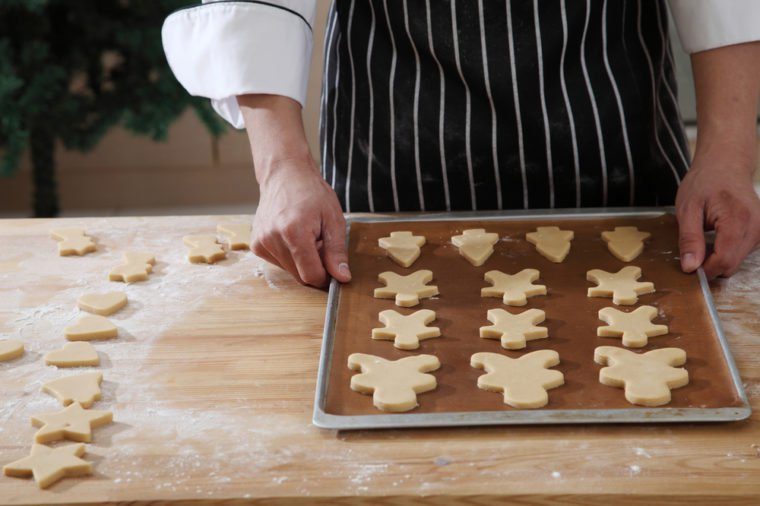
Look to the past
You’ve heard the old saying, “Those who don’t remember the past are doomed to repeat it.” Well, the same goes when you want to avoid holiday weight gain. Think about recent holidays and what went wrong—if you gained weight—but also what you did right. Plan to alter your routine this year for a different outcome. “Ask yourself what typically works well for you over the year when you’re managing your weight most effectively,” says Sofia Rydin-Gray, PhD, assistant professor of psychiatry and behavioral sciences at Duke University, and behavioural health director of the Duke Diet and Fitness Center. “Identify challenges from previous holiday seasons and think about the lessons you learned from them about how to cope and how to recover.” Then do your best to continue those habits throughout the holidays.
Looking for more inspiration? Check out these true stories of men who lost over 100 pounds.

Sleep on it
Not getting enough sleep carries a double weight whammy. “When you’re tired, your defenses go down,” says Carolyn Hintlian, MPH, RDN, a registered dietitian and nutritionist in Boston, explaining that you’re less competent to make healthy decisions when you’re feeling exhausted. But sleep also affects your metabolism and can make weight gain more likely. (Don’t miss these tricks to boost your metabolism.) Prioritizing sleep might mean limiting weekday parties if you have to get up early for work the next day; if that’s what it takes to prevent holiday weight gain, you might find that it’s worth missing out.
Discover 19 daily habits for a better night’s sleep.
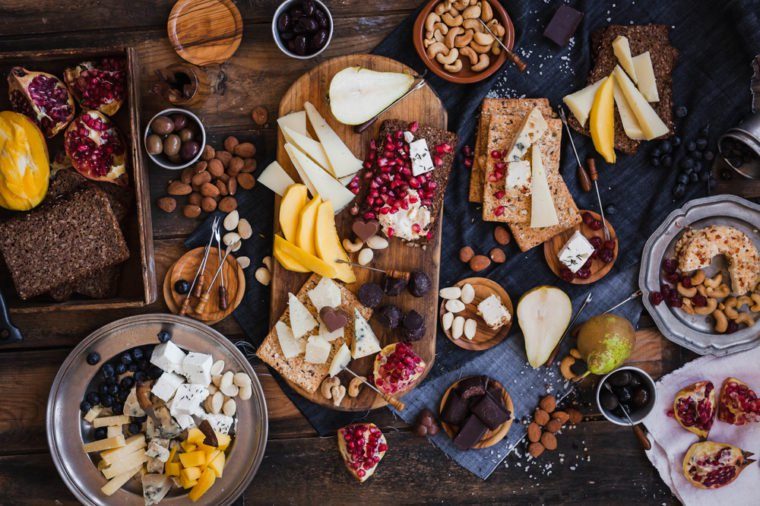
Do some reconnaissance
When you get to a party, “survey the available foods before you choose what to eat,” recommends Foster. “Then pay attention to what you’ve chosen and enjoy each bite.” After that, skip seconds, put down the plate, and focus on socializing, he advises. Don’t miss these 30 easy ways to cut 100 calories.
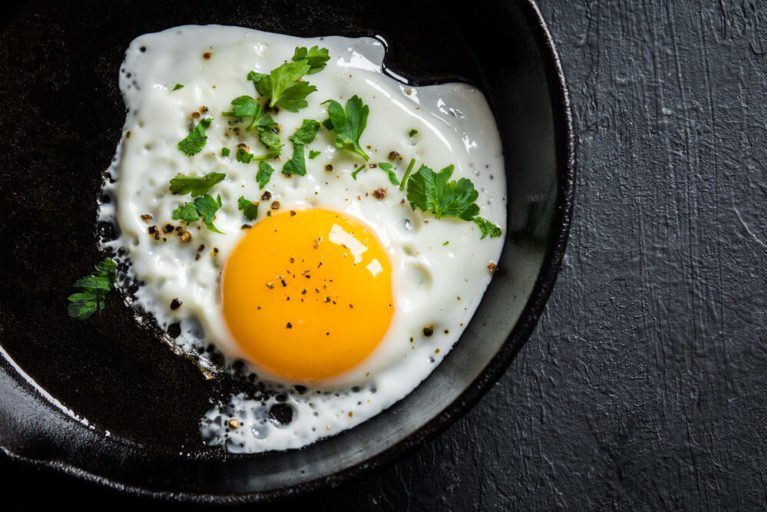
Eat an egg
You don’t want to go to a party hungry, because then you might be vulnerable to eating whatever is put in front of you. But you also don’t want to down too much beforehand since you know you’ll be noshing again soon. The solution? “Eat something high in protein before you head out,” advises Politti. “An egg is a good choice,” she says; other protein options include Greek yogurt or a small piece of chicken or turkey. “But don’t eat something sweet,” she advises. “Sweets enhance your appetite, proteins help curb it.” You also might be interested in these tips from TV’s The Biggest Loser to help you avoid holiday weight gain.
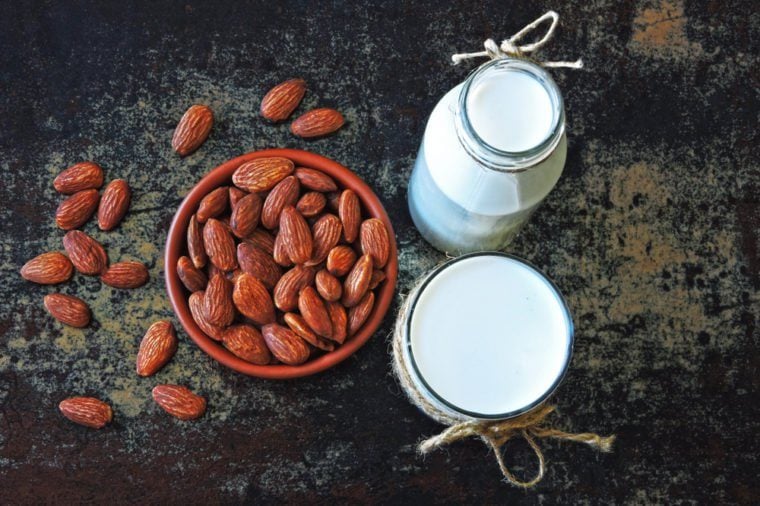
Pack a shopping survival kit
Here’s a familiar scenario: After a busy day at work, you head to the shops on the way home to cross off a few gifts on your list. Of course, it’s dinner time and you’re starving, so you grab a snack at the mall. The problem is mall food is much less healthy than an apple or banana. Change the scenario. “Bring your own snack,” urges Josefsburg. “If you carry a 100-calorie pack of nuts and a bottle of water you can get through the temptation and not be overly hungry.” (Here are 15 more healthy low-calorie snacks worth considering.) It’s tough, Josefsberg admits, because now there’s food sold in almost every store. “You can be buying underwear at Macy’s, and there’s Godiva chocolate near the checkout,” she says. “They’re trying to get you to spend more money in a weak moment.”
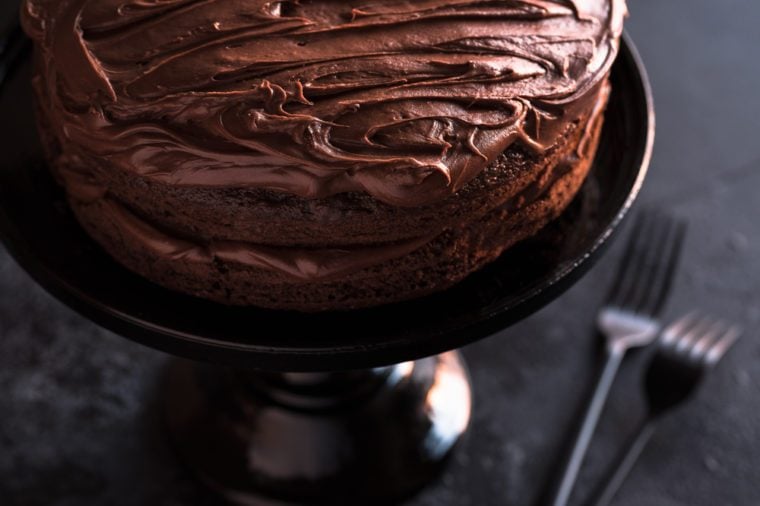
Don’t give up
When you inevitably do eat too much or have what you consider a setback in your healthy eating, you should try to focus on getting back on track—it can make all the difference, says Rydin-Gray. “Some people just say, ‘Oh, well I blew the whole holiday season,'” says Rydin-Gray, after just one mistake. That’s when eating a bit too much at a single dinner or party can turn into six weeks of overeating. Few people are perfect, “but you probably wouldn’t gain weight if you only ate more than usual three times over the season.” These are the sneaky reasons you’re actually gaining weight.
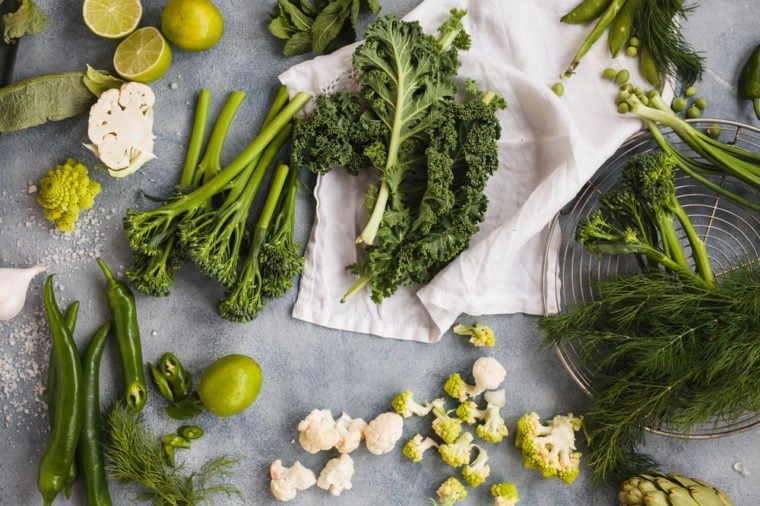
Strive for seven
Instead of focusing on the things you shouldn’t be eating over the holidays, try thinking about all the things you can eat, say the experts at the Cleveland Clinic. They advise making sure you include seven or more servings of fruits and vegetables in your diet each day. The fibre-full produce will help fill you up more than most snack foods without adding many calories. For the best chance of success, promise yourself that you’ll eat at least five servings of fruit or vegetables during the day before you snack on any sweet holiday treats. This easy change could also help you burn body fat faster.
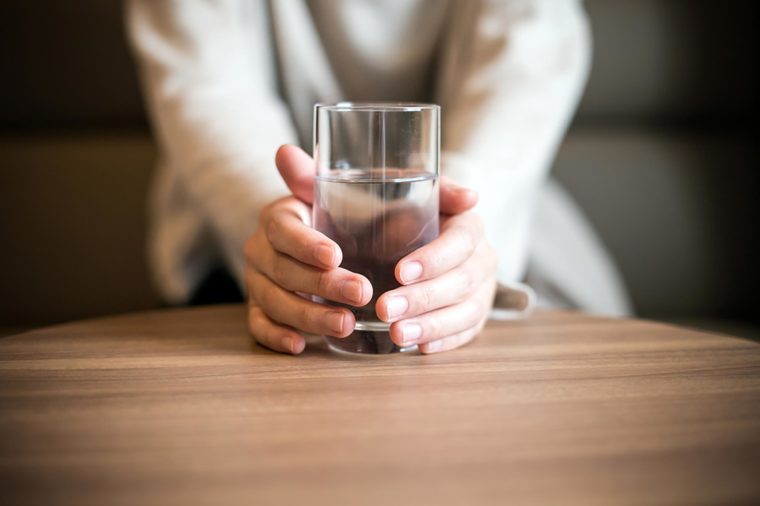
Ho, Ho, H20
Make water your go-to drink as much as possible to help avoid holiday weight gain. “If you drink water before and during holiday parties, it will help fill you up so you’re less likely to consume excess calories,” explains Mitzi Dulan, a popular nutrition and fitness expert, and founder of simplyFUEL. You’ll also enjoy these surprising benefits of staying hydrated.

Follow the 12-12 Rule
The latest science on weight and metabolism finds that we can help keep weight in check by giving our body daily breaks. That doesn’t mean fasts and cleanses. What it means is that you should try to aim for a 12 hour stretch out of every 24 hours where you don’t take in any calories. “It’s called time-restricted eating,” explains Peeke. “Most people live way off track when it comes to our circadian rhythms. The average American eats over the course of 15 hours, with the majority of calories after 3:00 p.m. Instead, try spending just 12 hours nourishing yourself, and give your body a 12-hour metabolic break for resetting and regenerating.” She points to research suggesting this approach not only tacks years onto your life, but it can also help you shed excess body fat, especially around the belly. So: If you finish dinner by 7:00 or 8:00 p.m. most nights, avoid food and caloric beverages until breakfast the following morning—at around 7:00 or 8:00 a.m. If you’re at a party and you’re eating and drinking until midnight? Skip breakfast the next day, then eat lunch or brunch at noon. Don’t miss these other proven benefits of intermittent fasting.
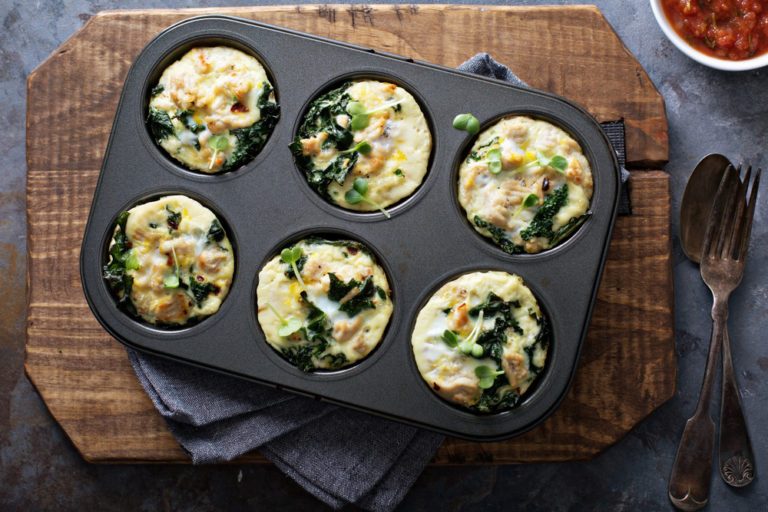
There’s got to be a morning after
“The most important meal is the recovery meal after the holiday celebration,” says Josefsberg. “On the morning after Thanksgiving, for example, your breakfast should signal to you that this is just a normal day. You don’t want Thanksgiving to include [the next several days], too.” Josefsberg advises clients to make something healthy in advance to avoid holiday weight gain—say, egg cups in muffin tins—so that it’s ready to eat the morning after that big meal. Or, she says, if you don’t want to do any cooking, a packet of oatmeal works, too. “Something that signals you won’t continue the party. You’ll start a normal day.” Here are 27 healthy breakfast ideas you can use today.

Step on it
The scale that is. “Weigh yourself at least once a week—but no more than once a day,” recommends Foster. He points to research indicating that people who want to maintain their weight—and weigh themselves daily or weekly—are more likely to succeed. It’s all about accountability.
These natural appetite suppressants can also help.
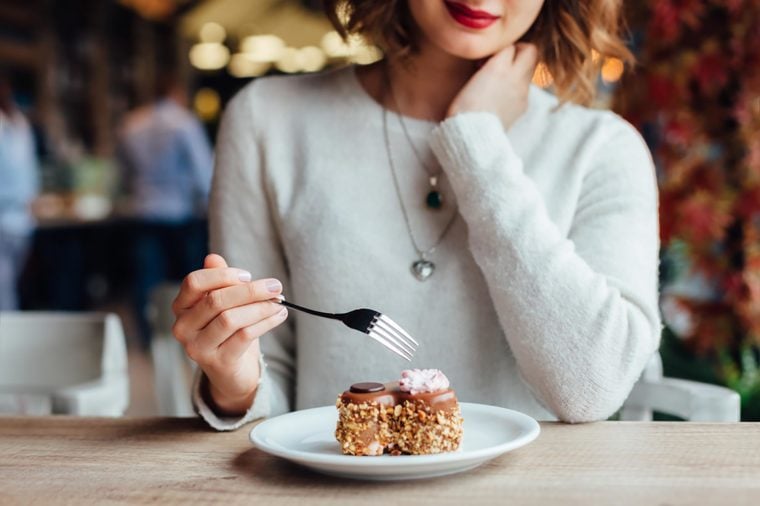
Be sweet smart
It’s probably not realistic for most of us to say we won’t eat any sweets over the holidays. But that doesn’t mean all rules are off. You can get maximum enjoyment from desserts with minimal quantity by following the three-bite rule: “The first bite will taste the best,” says Politti. “The second is still pretty good. But by the third bite, you’ll realize it’s not getting better.” That will be enough, she says. If you need more motivation to resist over-indulging on the sweets, here are 25 ways that sugar might be making you sick.

Be real about the challenge
“Don’t enter the holiday season with a dreamy vision of how you’ll breeze through it,” says Peeke. “Get real about your expectations, what the challenges are going to be, and how you’ll deal with them. Be proactive and determine how you’re going to work around each one.” For instance, she says, be firm with yourself about staying active, understand that the time crunch might lead you to skip exercise, and then resolve to find every opportunity to stay physically active. Here’s what happens to your body when you start walking 10,000 steps a day.

Just say “No”
We’re not talking about drugs, we’re talking about social events: “Learn that it’s OK to say no to certain invitations,” says Rydin-Gray. And even if you’ve already accepted an invitation, it’s OK to occasionally change your mind. “Just say you realized you’ve overbooked yourself and hope to get together some other time, but you have to change your ‘yes’ to a ‘no.’ Know your limits for socializing and travelling, and when those activities are likely to add too much stress to your healthy routine.”
Check out 50 ways to lose weight without a lick of exercise.
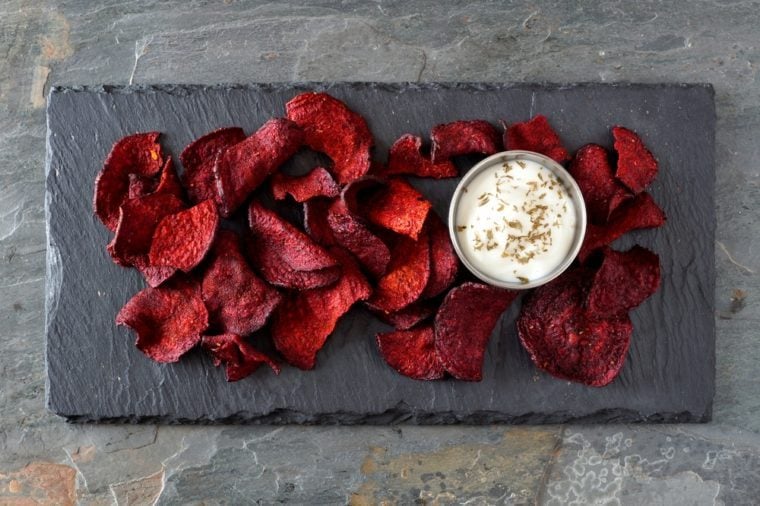
Avoid extras
“There’s butter for the bread, ranch dip for the veggies, gravy for the turkey, and honey mustard for the chicken fingers,” says Dulan. “Go easy on the condiments and dips. A little bit can go a long way and can save you from excess calories.”
These weight loss quotes can help keep you motivated!
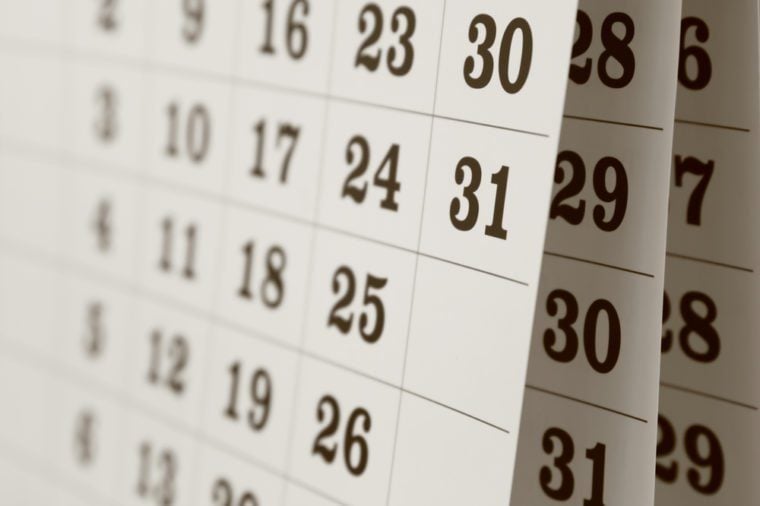
Don’t ease tension with food
“Many people overeat or overdrink when they’re nervous or tense and not enjoying themselves,” says Peeke. If you’re feeling out of your element, you might be more tempted to turn to sweets or booze. “For a short time after eating refined sugars your level of cortisol—the stress hormone—decreases and there’s a numbing effect,” says Peeke. “You may feel better, but it’s a faux reward, and the original feelings return pretty quickly. Then you pop out of your food coma saying, ‘What have I done?'” Remember that other people at parties are also nervous, anxious, uncomfortable. Here are 14 things only people with anxiety will understand.
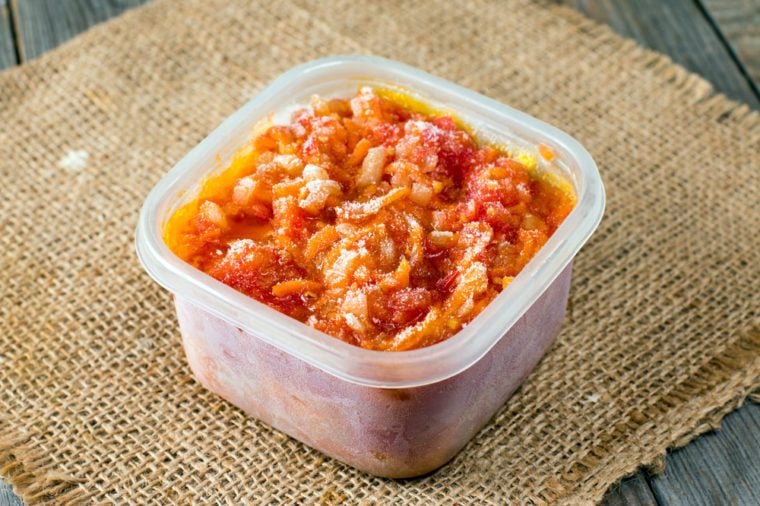
Leave leftovers
If you host a party, package up leftovers and send them home with your guests. If you’re a guest, refuse the offer of leftovers as politely as possible. “You need to isolate the dinner or party as a single event or meal,” says Josefsberg; bringing home the three-layer cheese dip will just encourage you to continue making poor eating choices. Here are more surprising ways to speed up your slimming-down process.
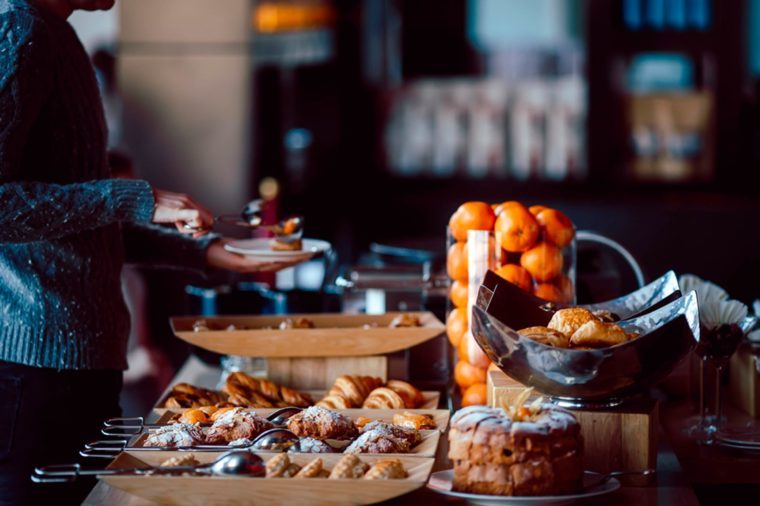
Think of a buffet as a menu
A buffet with lots of tempting options can be a challenge for many people. But according to Consumer Reports, one way to keep buffet meals manageable is to think of the spread of food in the same way you see a restaurant menu. Since you’d never order one of everything off a menu, you’ll be more likely to choose just a few food items for your meal. Or if you want to try a variety of dishes, think of it as ordering the sampler plate and take much smaller portions of each food. Think this sounds silly? Here are more bizarre weight loss tricks that actually work.

Have “The Talk”
Every year your grandmother brings her deep dish apple pie—and you feel obliged to eat a big slice. Or your mother says you’re looking thin and urges you to take seconds of mashed potatoes and gravy. This year, have a talk with your food-pushing relatives before the family meal and be firm about your intentions to avoid holiday weight gain. “Say, ‘I wanted you to know I’m trying to eat fewer carbohydrates,’ for example,” says Politti. She says that you can assure your relatives that you think their cooking or baking is delicious—but that you’re still planning to abstain. By having this conversation before the meal, you can avoid attention and conflict at the table and can stick to your healthy eating intentions. Here are more tips on how to avoid family conflict over the holidays.

‘Tis the season to de-stress
It’s easy to lose track of your own needs when you’re focused on doing things for others—the cooking, shopping, and wrapping. One way a lot of people deal with stress is by “rewarding” themselves with food. “It’s a good time to refocus on what you do for self-care to feel balanced during the rest of the year,” says Rydin-Gray. “You have to balance your other commitments to make time for the pillars of self-care which include eating healthier meals and getting regular exercise.” These expert stress management tips can also help.
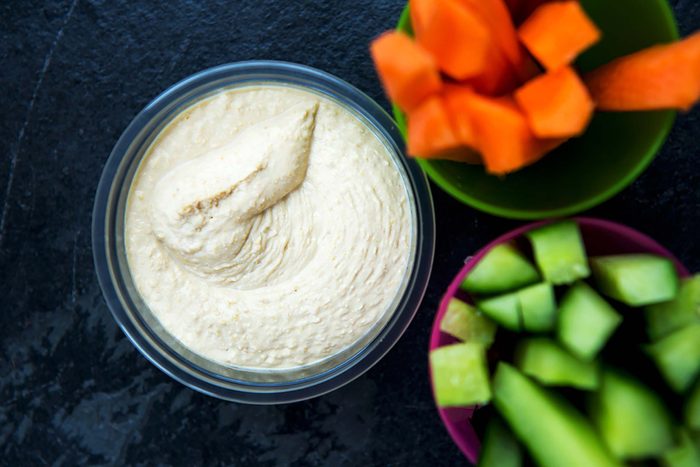
Walk away
“Don’t hang out by the food table,” advises Hintlian. “You hear about how important mindful eating is—being aware of what you’re putting in your mouth—but it’s really hard to be eating mindfully when you’re standing right next to the food.” Instead, take a plate of veggies, fruit, or other healthy nibbles, and then move away to another part of the room to stand and socialize.
Considering slashing your intake of carbohydrates? Here’s why low-carb diets aren’t the answer.
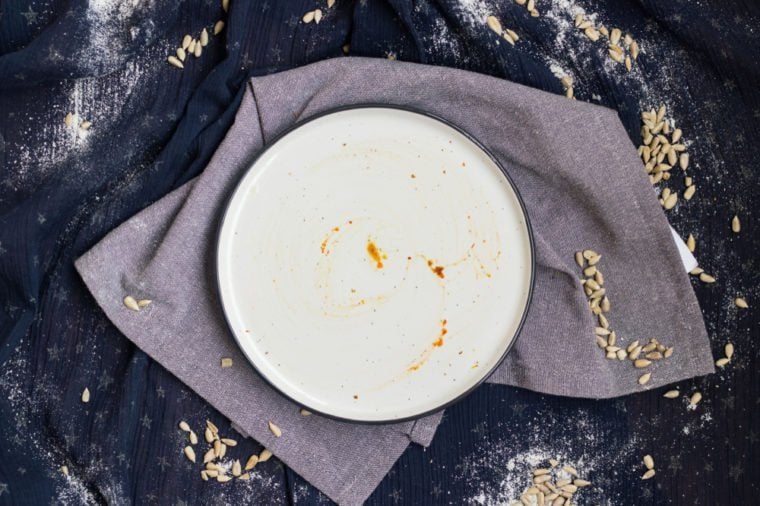
Stick to three square
“If you’re going to a party at 4:00 p.m., think about whether you need to eat dinner that evening as well. Don’t eat extra meals,” advises Politti. If you get hungry later in the evening, you can always make yourself a small, healthy snack. You may want to check out these expert-approved strategies to get the metabolism of a 25-year-old.

Take it slow
“Slowing your pace of eating can help increase your awareness—and your enjoyment—of how much and what you are eating,” says Foster. “You can try pacing yourself with the slowest eater at the table, or putting down your fork between bites.” By the time the meal is over, you will have eaten much less than if you’d just scarfed down your food. Don’t miss the inspiring story of how this fitness blogger lost 45 pounds—and kept it off.
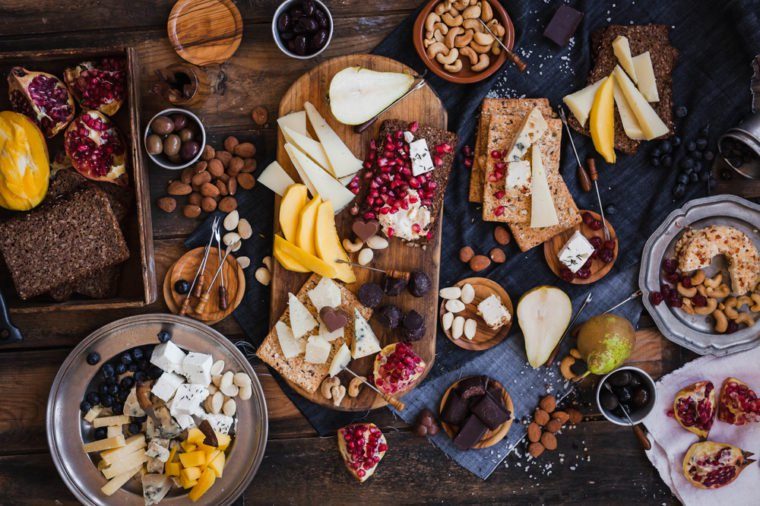
Ask yourself two questions
- If I consume this food/drink, will I feel like I’ve lost control?
- If consume this food/drink, will I feel shame, blame, or guilt?
“Be honest with yourself, and if the answer is yes—usually to both—then get out of there,” advises Peeke. “There are plenty of treats you can have without feeling any of those emotions.” Tend to suffer from self-blame? Here are expert-approved strategies to stop feeling guilty all the time.

Recognize your triggers
Emotional eating and drinking come into play during the holidays when you may be forced to spend time with critical relatives, unpleasant co-workers, or people you have a toxic relationship with. Those situations may act as a trigger. “Are you consuming alcoholic beverages, for example, to deal with those emotions or that stress?” asks Rydin-Gray. Think about the things that can trigger overeating or drinking for the rest of the year, and make an extra effort to avoid those situations or at least be prepared for them.
Need more motivation? Check out these inspirational weight loss transformations.
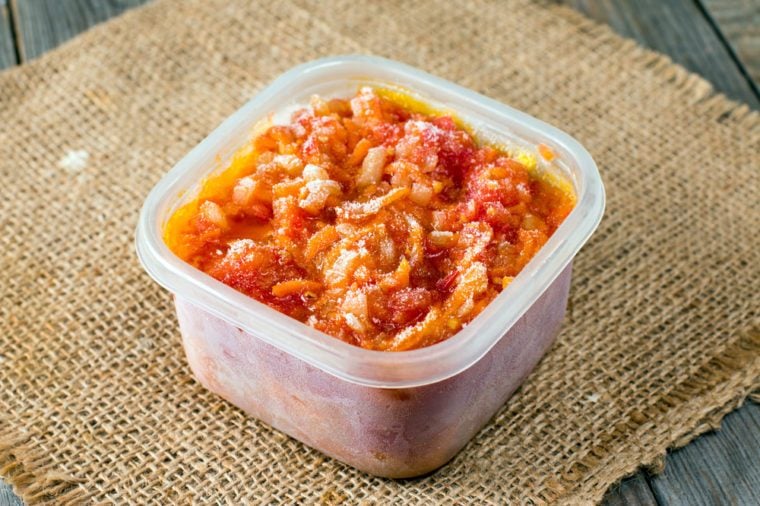
Don’t accept holiday weight gain
“It’s a common misperception that people gain five to 10 pounds over the holidays, but there’s very little data on this,” says Foster. “A small study of professionals demonstrated that weight gain between the fall season and New Year’s appears to be around a pound on average.” That’s both encouraging news, and a reminder that if you are gaining weight over the holidays, you shouldn’t accept it as inevitable, but try different tips and strategies to find what works for you. Here are 30 tiny diet changes that can help you stay on track.